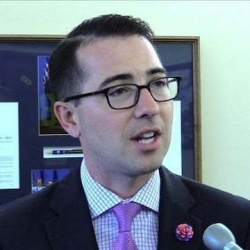
Brandt Iden’s HB 4926 was passed by both houses of the Michigan legislature in 2018, but departing Gov. Rick Snyder vetoed the bill.
Jeff Ifrah of The Detroit News wrote that State Rep. Brandt Iden plans to introduce another sports betting and online gambling bill to the Michigan state legislature in 2019. Such a bill has a high percentage chance of passing, as the Michigan Senate and House of Representatives each passed HB 4926 last year.
A veto by departing Gov. Rick Snyder (R-Ann Arbor) killed the bill in late-December, but Rep. Iden said at the time that sentiment was coalescing to pass a comprehensive gambling bill at the time. New Gov. Gretchen Whitmer (D-East Lansing) has not said if she would support such a bill.
Several new dynamics are in play for the 2019, besides the inclusion of Gretchen Whitmer. While Republicans maintain the majority in both houses of the legislature, Democrats gained 5 seats in both houses during the 2018 midterm elections and therefore are more of a factor in any bill’s passage.
Gambling is seen as a “vote of conscience” in most states in the United States, meaning that members of both parties do not have to adhere to a strict party line vote. Such votes are less predictable than votes which include the whip, so Iden and HB 4926’s supporters will have to count votes with a bevy of new lawmakers.
Intrastate Online Poker
Also, the U.S. Justice Department issued an opinion last month which makes interestate online casinos and poker sites illegal under federal law. While a state can offer single-state gambling on online and mobile gaming sites, the DOJ’s decision means Michigan could not join the Multi-State Internet Gambling Association (MSIGA), often known as the interestate poker compact.
Any gaming websites or betting apps would need to be handled with servers in Michigan, while such gaming could not cross interstate or international boundaries. This is possible, but gaming operators and the software companies which support them would have to pay additional expenses to make it so.
Michigan lawmakers and the Whitmer administration would have to consider possible lawsuits that might lengthen the time required to launch certain forms of Internet gambling. Those same officials would have to consider that investments of time, resources, and money could be spent on activities that ultimately are banned at the federal level.
Jeff Ifrah Supports HB 4926
Jeff Ifrah’s column in The Detroit News defended House Bill 4926 on legal, economic, and ethical grounds. Ifrah stated, “Legalizing online gaming would establish a regulated and safe platform for residents to participate in a favorite American pastime that’s already happening in Michigan, but illegally. An online gaming bill would also pave the way for legal sports betting in the state.”
“Whether it’s a bet made in an office pool on the Super Bowl or a wager placed on a March Madness bracket, Michigan residents continue to bet on their favorite teams, even though it’s technically illegal in the state. To safely regulate this industry and provide online entertainment in a legal environment, a law is needed.”
“Regulated online gaming is the only way to ensure all players and their information are secure, providing significant safeguards for consumers who chose to participate. In fact, it’s far easier to verify a player’s age and monitor spending online than it is in person.”
Arguments for Online Gambling
Mr. Ifrah stated in his op-ed piece that New Jersey generated $300 million in revenues in 2018 through online casinos and poker rooms. He added that New Jersey’s iGaming industry has collected over $1 billion since its launch in November 2013 — and the revenue stream continues to grow each year.
As other advocates of legal online gambling have argued, New Jersey collects taxes on the gaming revenue, but operators are happy to pay such taxes, due to the legal protections in place for operators and their customers. Legal online gambling keeps New Jersey’s government from either raising taxes or cutting services.
Michigan is comparable to New Jersey, because the two states have similar population sizes. If New Jersey can generate $300 million (and counting) on online gambling, then so could Michigan.
Sports Betting
To make the bill palatable for land-based casinos, such gaming facilities could open sportsbooks in Michigan, too. While sports betting has a low margin, it drives customers into casinos. People who might not enjoy slots, blackjack, or poker might be sports fans who enjoy a legal bet on sporting events.
Those people visit the sportsbook to bet, then stay to watch the game in many cases. Those customers consume food and drink and, in some cases, buy hotel rooms. Some even visit the casino floor for slots, blackjack, or other casino betting. Sports betting thus helps land-based casinos in a variety of ways.
Sports betting legalization certainly helped Brandt Iden pass House Bill 4926 last year. After several years of futility in passing the Michigan Senate, Iden attached sports betting provisions to HB 4926 and it gained the needed support. Only one person, Rick Snyder, kept the bill from becoming law.
That might change in 2019.
